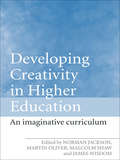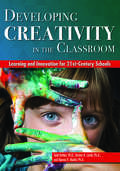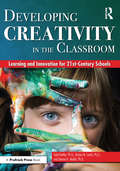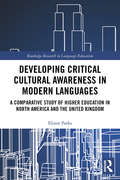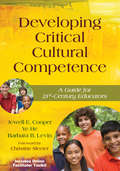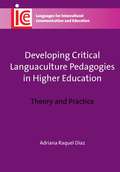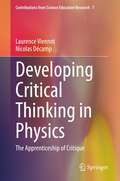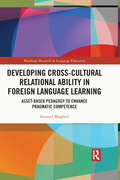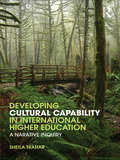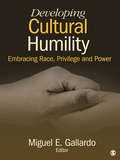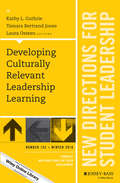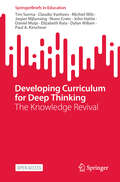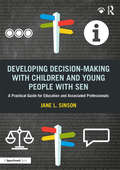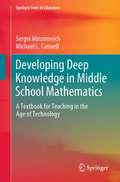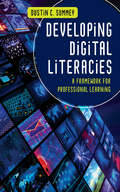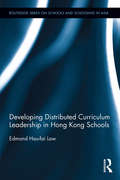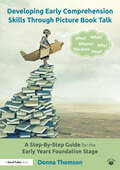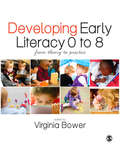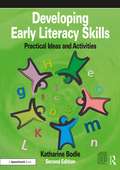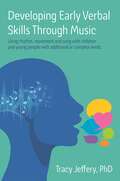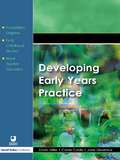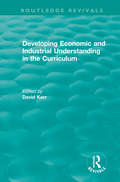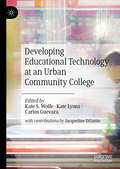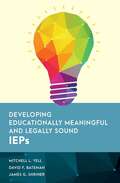- Table View
- List View
Developing Creativity in Higher Education: An Imaginative Curriculum
by Martin Oliver Norman Jackson Malcolm Shaw James WisdomGraduates face a world of complexity which demands flexibility, adaptability, self-reliance and innovation, but while the development of creativity is embedded in the English National Curriculum and in workplace training, the higher education sector has yet to fully recognise its importance.This book highlights how pressures such as quality assurance, peer review systems, demands for greater efficiency and increased research output are effectively discouraging innovation and creativity in higher education. It makes a bold case for the integration of creativity in higher education, drawing together contributors and research from around the world and explores valuable lessons learnt from those working in schools and professional organisations. Offering a wealth of advice on how to foster creativity on an individual and an institutional level, this book encourages lecturers to engage with the ideas and practice involved in helping students to be creative in all areas of their study.
Developing Creativity in the Classroom
by Dianna Mullet Todd Kettler Kristen LambDeveloping Creativity in the Classroom applies the most current theory and research on creativity to support the design of teaching and learning. Creative thinking and problem solving are at the heart of learning and application as students prepare for innovation-driven careers. This text debunks myths about creativity and teaching and, instead, illustrates productive conceptions of creative thinking and innovation, including a constructivist learning approach in which creative thinking enhances and strengthens conceptual understanding of the curriculum. Through models of teaching that support creativity and problem solving, this book extends the idea of a creative pedagogy to the four core curriculum domains with explanations and examples of how creative thinking and deep learning merge to support engaging learning environments taking seriously the challenge of developing 21st-century competencies.
Developing Creativity in the Classroom: Learning and Innovation for 21st-Century Schools
by Todd Kettler Kristen N. Lamb Dianna R. MulletDeveloping Creativity in the Classroom applies the most current theory and research on creativity to support the design of teaching and learning. Creative thinking and problem solving are at the heart of learning and application as students prepare for innovation-driven careers. This text debunks myths about creativity and teaching and, instead, illustrates productive conceptions of creative thinking and innovation, including a constructivist learning approach in which creative thinking enhances and strengthens conceptual understanding of the curriculum. Through models of teaching that support creativity and problem solving, this book extends the idea of a creative pedagogy to the four core curriculum domains. Developing Creativity in the Classroom focuses on explanations and examples of how creative thinking and deep learning merge to support engaging learning environments, rising to the challenge of developing 21st-century competencies.
Developing Critical Cultural Awareness in Modern Languages: A Comparative Study of Higher Education in North America and the United Kingdom (Routledge Research in Language Education)
by Elinor ParksThis volume explores the relationship between language and culture while considering its implications for the teaching of modern foreign languages in higher education. Drawing on a comparative empirical study conducted at universities both in the UK and US, this text problematises the impacts of a separation of language and content in German degree programmes. Illustrating the need for a curriculum which fosters the development of intercultural competence and criticality, Parks reconceptualises established models of criticality (Barnett) and intercultural communicative competence (Byram). The chapters in this volume discuss a range of important topics including; language graduates with deep translingual and transcultural competence, observed differences and similarities between British and American universities and faculty and student voices: developing intercultural competence and criticality. Aimed at scholars with research interests in intercultural communication, language education and applied linguistics, this volume provides a thorough discussion for the ways in which modern language programmes in higher education can be improved. Additionally, those carrying out research in the fields of language teaching and language policy in higher education will find Developing Critical Cultural Awareness in Modern Languages to be of great relevance.
Developing Critical Cultural Competence: A Guide for 21st-Century Educators
by Ye He Dr Barbara B. Levin Jewell CooperCultural competence is key to improved student achievement This book shows you how to provide professional development for teachers that deepens their cultural understanding. The authors provide activities to help educators translate new knowledge into action with activities that focus on the three inseparable insights required for developing teachers’ critical cultural competency: Understanding themselves, Understanding their students, Understanding their students’ families and communities. Readers have access to a companion website that contains reproducible resource lists and handouts as well as examples that can serve as models for some of the activities.
Developing Critical Languaculture Pedagogies in Higher Education
by Adriana Raquel DíazDespite widespread agreement about the need to develop interculturally competent graduates, there is a lack of agreement about how this goal may be achieved in practice. This is significant as universities around the world, particularly in English-speaking countries, have espoused an interculturally-aware vision for their future graduates and turned to language education, as an inherently intercultural activity, to expose students to a world which is linguistically and culturally different from their own. This book focuses on narrowing the gap between the often conflicting theoretical and practical imperatives faced by language teachers in an internationalised higher education context. It does so by providing comprehensive conceptual discussions of emerging critical intercultural language pedagogies as well as empirical accounts and case studies from the frontline.
Developing Critical Thinking in Physics: The Apprenticeship of Critique (Contributions from Science Education Research #7)
by Laurence Viennot Nicolas DécampThis book promotes the effective implementation and development of critical analysis in physics. It focuses on explanatory texts concerning subjects typically dealt with in secondary or higher education and addressed in an academic or popular context. It highlights the general difficulties and obstacles inherent in teaching physics and shows how some tools can help to combine successful criticism and better understanding. The book examines the main reasons to call a text into question and looks at risk factors such as simplifications, story-like explanations and visual analogies. It takes inventory of the benefits and limits of critical analysis and discusses the complex links between conceptual mastery and critical attitude. The book ends by offering tools to activate critical thinking and ways for educators to guide students towards productive critical analysis.
Developing Cross-Cultural Relational Ability in Foreign Language Learning: Asset-Based Pedagogy to Enhance Pragmatic Competence (Routledge Research in Language Education)
by Gerrard MugfordBy reconceptualizing successful communication in a foreign language as an enjoyable and uplifting experience, this volume moves beyond a focus on grammatical accuracy and fluency to foreground the ways in which foreign language learners can be encouraged to build on previous achievements and communicative successes in the target language and so develop confidence, commitment and cross-cultural relational ability. Building on Mugford’s previous volume, Addressing Difficult Situations in Foreign-Language Learning (2019), this text draws on grounded qualitative data collected through questionnaires, semi-structured interviews and conversations with Spanish-speaking learners of English, to illustrate how learners’ experiences and insights can be used to inform a productive pedagogy centred around language users’ communicative objectives and interactional successes. Chapters highlight bilingual speakers’ conscious language use, practices and choices in the target language and the reasons and implications for such deliberate communicative practices and relational behaviour. In doing so, Mugford is able to outline a critical relational pedagogy designed to better equip language learners with the confidence and pragmatic resources they require to engage in positive cross-cultural relational work. As a valuable, student-centred contribution to teaching and learning of modern foreign languages, this volume will be key reading for researchers, scholars and educators with an interest in language education, TESOL, World Language teaching and Applied Linguistics.
Developing Cultural Capability in International Higher Education: A Narrative Inquiry
by Sheila TraharTo function in the diverse world of the twenty-first century requires a crucial ability to navigate its international and interconnected environments effectively. Such a skill may be defined as cultural capability and developing it is at the forefront of this book, as it guides readers in considering their own experiences of learning and teaching in culturally varied contexts of higher education. Using information that builds upon data gained from several years of practice, across a range of countries and institutions the author considers in detail four main themes: Learning, teaching and assessment as a cultural product of higher education Personal and professional interactions between staff and students The political and personal dimensions of the internationalisation of higher education Methodological and ethical considerations when conducting research across cultures These themes provide for rich opportunities to learn from and about others, about our similarities and differences. In this way, Developing Cultural Capability celebrates a world that is multicultural and interdependent, encouraging operation beyond local and national perspectives. Conducting cross-cultural research is not new, but this book shows how narrative inquiry may be a particularly rich – and sensitive - approach in such research in higher education. By writing as a practitioner researcher who has reflected, extensively and critically, on her own practice, the author here gathers together empirical research, case studies and personal reflections, beliefs and assumptions into an innovative account of cultural capability. Through these rich accounts, this book stimulates researchers or practitioners grappling with the cultural complexity of higher education today to reflect on their own practices, proposing some ways to create environments that are more inclusive.
Developing Cultural Humility: Embracing Race, Privilege and Power
by Miguel E. GallardoDeveloping Cultural Humility offers a unique look into the journeys of psychologists striving towards an integration of multiculturalism in their personal and professional lives. Contributing authors—representing a mix of “cultural backgrounds” but stereotypically identified as “White”—engage in thoughtful dialogue with psychologists from underrepresented communities who are identified as established and respected individuals within the multicultural field. The contributing authors discuss both the challenges and rewards they experienced in their own journeys and how they continue to engage in the process of staying connected to their cultural identity and to being culturally responsive. In addition, psychologists who represent historically disenfranchised communities have similarly reflected on their own journey, while offering commentary to the personal stories of White psychologists. This text is useful for stimulating discussions about privilege, power, and the impact race has on either bringing people together or creating more distance, whether intentionally or unintentionally. It demonstrates to readers how to engage in the process of examining one’s own “culture” in more intentional ways, and discusses the implications as we move towards engaging in more dialogue around multicultural issues.
Developing Culturally Relevant Leadership Learning: New Directions for Student Leadership, Number 152 (J-B SL Single Issue Student Leadership)
by Kathy L. Guthrie Tamara Bertrand Jones Laura OsteenThe notion of culturally relevant leadership learning builds upon the ideas of developing leader identity and leadership capacity of diverse students. Focusing on four areas of leadership learning: education, training, development, and engagement, this volume presents a model of culturally relevant leadership learning in order to develop all student leaders. It proposes infusing the leadership development process with an understanding of how systemic oppression influences educational contexts and with an engagement in and across cultural differences. Our contexts and differences influence knowledge of self, others, cultural contexts and systems, and ultimately students’ knowledge and enactment of leadership.To this end, culturally relevant leadership development programs equip all students with the knowledge and skills to navigate diverse settings and lead culturally diverse groups and teams. Transforming the framework for how leadership programs are designed will result in contextually relevant leadership development programs and an increase in the breadth and depth of a diverse leadership cadre for our society.The Jossey-Bass quarterly report series New Directions for Student Leadership explores leadership concepts and pedagogical topics of interest to high school and college leadership educators. Issues are grounded in scholarship and feature practical applications and best practices in youth and adult leadership education.
Developing Curriculum for Deep Thinking: The Knowledge Revival (SpringerBriefs in Education)
by Daniel Muijs Nuno Crato John Hattie Dylan Wiliam Elizabeth Rata Paul A. Kirschner Tim Surma Claudio Vanhees Michiel Wils Jasper NijlunsingThis open access book discusses why the seemingly straightforward strategy of teaching children how to think deeply does not work and offers an alternative way forward for the curriculum to achieve these objectives. Over the years, the role of knowledge in the curriculum has, like a pendulum, shifted between two extremes, from highly visible to virtually invisible knowledge elements. Insights from cognitive and educational psychology, sociology, and curriculum studies are used to underpin the current knowledge revival that is widely being observed in education. A knowledge-rich curriculum is proposed by the authors as not only the soundest way forward to both effectively acquire knowledge and complex cognitive skills in school, but also as a crucial lever to achieve equitable opportunities for all students. In understanding how a knowledge-rich curriculum can enhance learning, three overarching principles are discussed: (1) content-richness, (2) coherence, and (3) clarity. These principles are illustrated through practical examples from schools and educators who have effectively integrated knowledge-rich curricula.
Developing Decision-making with Children and Young People with SEN: A Practical Guide For Education and Associated Professionals
by Jane L. SinsonWe all make decisions every day, but are you aware of the process you use to make a decision? This essential practical guide for education and associated professionals, using education-focused case studies throughout to illustrate key points, explains the mechanics of decision-making, introducing the associated language and concepts. It presents both a practical decision-making framework based in the Mental Capacity Act decision-making process, and a decision-making syllabus, from which education professionals can create their own curriculum. Being able to make decisions is an important life skill, which can have a positive impact on well-being. However, many children and young people with SEN will need direct teaching and guidance to develop this ability, from the earliest age. The book explores the types of important decisions children and young people may need to make in relation to their education, with particular focus on choosing a new educational placement, providing practical guidance about how education professionals can support young people to make this decision. There is reference throughout the book as to the ways in which practitioners can work in partnership with parents to support and develop children and young people’s decision-making ability. Appendices provide completed decision-making frameworks and associated guidance.
Developing Deep Knowledge in Middle School Mathematics: A Textbook for Teaching in the Age of Technology (Springer Texts in Education)
by Sergei Abramovich Michael L. ConnellThis textbook is for prospective teachers of middle school mathematics. It reflects on the authors’ experience in offering various mathematics education courses to prospective teachers in the US and Canada. In particular, the content can support one or more of 24-semester-hour courses recommended by the Conference Board of the Mathematical Sciences (2012) for the mathematical preparation of middle school teachers. The textbook integrates grade-appropriate content on all major topics in the middle school mathematics curriculum with international recommendations for teaching the content, making it relevant for a global readership. The textbook emphasizes the inherent connections between mathematics and real life, since many mathematical concepts and procedures stem from common sense, something that schoolchildren intuitively possess. This focus on teaching formal mathematics with reference to real life and common sense is essential to its pedagogical approach. In addition, the textbook stresses the importance of being able to use technology as an exploratory tool, and being familiar with its strengths and weaknesses. In keeping with this emphasis on the use of technology, both physical (manipulatives) and digital (commonly available educational software), it also explores e.g. the use of computer graphing software for digital fabrication. In closing, the textbook addresses the issue of creativity as a crucial aspect of education in the digital age in general, and in mathematics education in particular.
Developing Digital Literacies: A Framework for Professional Learning
by Dustin C. SummeyTurn teachers—and students—into tech-savvy digital citizens! When teachers harness technologies and digital resources, they build upon their teaching expertise and change the way students learn. With this comprehensive job-embedded professional development program, you will help K–12 teachers incorporate digital literacies into their classroom practice. Features include: A modular, adaptable framework that capitalizes on existing personnel and resources Instructions on developing Personal Learning Networks (PLNs) for applying digital literacies in the classroom Tips for maximizing teacher buy-in Technology-related supports for schoolwide curriculum integration A companion website with electronic planning and implementation materials, sample instructional tools, and links to resources
Developing Distributed Curriculum Leadership in Hong Kong Schools (Routledge Series on Schools and Schooling in Asia)
by Edmond Hau-fai LawThe book aims to explore distributed leadership in developing curriculum innovations in schools with a target of bringing about theoretical underpinnings in the West with the empirical studies and practices in the East. It examines theoretically the roots of the curriculum leadership studies and practically with the empirical data and case studies in Hong Kong which has been considered a melting pot of the Western concepts and innovations in a land of Eastern cultures. The examination is framed within theoretical frameworks of activity theories, discourse analysis and social network systems. The findings will show the impact of the cultural traditions of Eastern countries in the mediation of the direction of the discourses in teacher meetings and the effectiveness of decision making in the processes of developing school based curriculum leadership. The book is theoretically exploratory with practically examined practices for educational leaders like schools headers and department leaders as well as teachers who aim at asserting greater influence in the educational decision making processes. Topics discussed in the book include: Curriculum leadership functions and patterns of leadership distribution Engaging teachers in reflective practice: tensions between ideological orientations and pragmatic considerations Models of distributed leadership: focus, development and future Initiating, designing and enacting curriculum innovations: procedures and processes This book will appeal to researchers interested in Curriculum Studies, School leadership and comparative education. Those who studies the theory of education and Asian education will also find this book valuable.
Developing Early Communication, Language and Learning Skills at Home: Creating Personalised Activity Packs for Parents
by Laura Osman Heidi ManouchehriDeveloping Early Communication, Language and Learning Skills at Home is full of tried-and-tested, practical activities for children developing their communication, language and learning skills including those with special educational needs and disabilities. This book provides parents, teachers and therapists with a range of playful and engaging activities to consolidate and develop children’s language and communication skills at home and school. Organised into five areas, the resource includes motivating activities around the themes of outdoor activities, daily routines, messy play, games for turn-taking and games to encourage creativity and make sense of the world. Features include: • 50 activities, each with a list of equipment, instructions, top tips, key vocabulary and ideas for extending the activity next time • Symbol boards for each activity to support children’s understanding and experiences • Photocopiable sheets for ease of use • Guidance on how to tailor activities to the interests and needs of the child to produce a personalised activity pack • An activity checklist to help you maximise your interactions with the child • An activity log to record children’s responses and achievements With clear and easy-to-follow instructions, the activities are suitable for use with children who are non-verbal, still developing their early communication or children who are talking. This is an invaluable resource for teachers, teaching assistants or therapists to share relevant activities with parents, and can equally be used by parents as a stand-alone resource. Designed to support the transfer of learning from school to home, this book will empower anyone working with children with SEND to develop children’s communication, language and learning through playful interactions.
Developing Early Comprehension Skills Through Picture Book Talk: A Step-By-Step Guide for the Early Years Foundation Stage
by Donna ThomsonDeveloping Early Comprehension Skills Through Picture Book Talk demonstrates how strategic ‘picture reading’ and playful sensory learning can develop young children’s explicit and implicit comprehension skills, regardless of their decoding ability. Offering an inclusive teaching and assessment approach that aligns with the Early Years Foundation Stage (EYFS) framework and supports the early adopter school initiative, it will help readers to guide children’s use of picture-reading-for-meaning strategies in preparation for more complex comprehension instruction in Year 1. The book also contains useful resources such as colour picture booklets and downloadable family workshop sessions to help guide parents in more effective ‘picture book talk’ at home. It offers corresponding steps for planning, teaching, and assessing children’s ‘picture book talk’, multisensory learning, self-questioning skills, and early reading for meaning. The methods and activities within this book specifically help to develop: • vocabulary (setting vocabulary, character vocabulary, general vocabulary) • communication and language skills • critical thinking and inference skills • metacognition (personal learning awareness) • self-confidence and self-regulation skills Providing examples of practice, photocopiable resources, and step-by-step guidance for teaching key comprehension strategies and early self-regulation skills, this book is essential reading for all those who work with young children and wish to encourage a love of reading.
Developing Early Literacy 0-8: From Theory to Practice
by Virginia Bower'Developing Early Literacy presents an interesting range of literacy-related topics which address issues of current importance to early years practice and, in places, question current thinking. There is an excellent balance of theoretical background and case study examples which would make this a relevant and practical text for both students and early years professionals.' - Mary-Louise Maynes, Lecturer in Early Childhood Studies, Bishop Grosseteste University Providing clear guidance on how to develop early literacy, this book offers support with the planning and teaching of this vital aspect of the curriculum using innovative and exciting methods. Linking theory with practice, topics covered include: babies and very early communication the importance of role play corners outdoor learning and literacy how rhyme and repetition help to develop literacy teaching literacy to children who have English as an Additional Language (EAL) literacy and diversity using picture books to develop literacy supporting transitions different approaches to the teaching of phonics and early reading. Each chapter has learning objectives, case studies featuring younger and older children from the Birth to 8 age range, a summary and suggested Further Reading. This text is essential reading for those on Early Childhood Studies, Early Years, Primary PGCE and Early Years teacher education courses. Virginia Bower is Senior Lecturer at Canterbury Christ Church University.
Developing Early Literacy Skills: Practical Ideas and Activities
by Katharine BodleA valuable resource for professionals working with pre-school children, or with older children lacking basic literacy skills, this book provides practical photocopiable activities to develop the early skills required for success with literacy. Includes: rhyming activities; alphabet activities; phonological awareness; writing and handwriting; and reading. Each section is structured so that children can build up their knowledge and skills. Developed within the classroom, these ideas and activities can be used with a range of children in whole class, group and individual situations both at home and in pre-school settings. Designed to help children showing early signs of dyslexia or a specific learning difficulty, these activities will also benefit older children who lack a foundation of early literacy skills. This updated edition reflects changes in legislation, and includes refreshed word lists and new subject areas, such as visual perception, fine and gross motor skills. It is invaluable for teachers, learning support assistants, nursery workers, parents and carers.
Developing Early Verbal Skills Through Music: Using rhythm, movement and song with children and young people with additional or complex needs
by Tracy JefferyDrawing on current research about the connections between music and speech, this book explains how and why musical activities can be used to support the mechanisms and processes needed for speech. Containing specific guidance on the physiological, neurological, and learning differences children face when trying to make sense of speech, including hypermobility, autism spectrum conditions, Down Syndrome, auditory processing differences and motor timing difficulties, this guide provides an in-depth evaluation into how you can enhance your practice.Discover evidence-based and easy-to-use activities such as how to use whistles for breathing, drums to support the ability to 'hear' or produce speech sounds, and how to use songs to support speech.
Developing Early Years Practice
by Linda Miller Carrie Cable Jane DevereuxThis book provides readers working in a diverse range of early years settings with the underpinning knowledge required to increase their effectiveness in working with young children. It will explore a wide range of issues including: the roles and responsibilities of practitioners; developing reflective practice; how children learn and develop; earl
Developing Economic and Industrial Understanding in the Curriculum (Routledge Revivals)
by David KerrPublished in 1994. Integrating cross-curricular themes into the curriculum has emerged as a major challenge for all schools. What is their relevance to the specialist subject teacher? How can the hard-pressed teacher ensure their coverage through the statutory programmes of study and statements of attainment? How does a school ensure that each pupil's experience makes sense – across the curriculum, at any one time, and in the course of time? How can a school link with partners in the local community to enhance cross-curricular work? This challenge remains as National Curriculum content and procedures are streamlined. Primary and secondary school teachers will find here a book filled with practical suggestions from a wide range of subject-specialist viewpoints. These highlight opportunities for developing economic and industrial understanding (EIU) and economic awareness through work in the other cross-curricular areas, through the National Curriculum core and foundation subjects and through other areas of study. Whatever the shape of the National Curriculum in years to come, this book and its companion volumes provide – for heads and deputies, teachers engaged in curriculum coordination and delivery, school inspectors, advisers, initial teacher trainers, INSET providers and those in the community – a wealth of ideas to embed cross-curricular issues into the whole school and its curriculum.
Developing Educational Technology at an Urban Community College
by Jacqueline DiSantoThis book uses a mix of personal narratives, anecdotal evidence, and research-based findings to tell the story of a small, urban community college’s efforts to develop and nurture a Community of Practice (CoP) that would galvanize the campus’ adoption of Educational Technology. Located in one of the poorest congressional district in the United States, Hostos Community College, a Hispanic-serving institution and part of the City University of New York (CUNY), has a unique history rooted in activism, advocacy, and community outreach, and has built a reputation for technology innovation. This book is a collection of writing from faculty and staff members whose decades of experience integrating technology into the classroom pre-dates many of the official initiatives now in place at CUNY.
Developing Educationally Meaningful and Legally Sound IEPs
by Mitchell L. Yell David F. Bateman James G. ShrinerThe purpose of this book is to assist readers to use better practices when developing educationally meaningful and legally sound Individualized Education Programs (IEPs). Beginning with the history and purpose of IEPs, this book examines the context and reasons IEPs were first created. The core chapters address better practices in conducting assessments, developing present levels of academic achievement and functional performance statements, crafting measurable annual goals, determining special education services, and monitoring and reporting on students’ progress. The authors also discuss placing students with disabilities in the least restrictive environment (LRE) and provide forms and graphics to assist in developing students’ special education programs.
